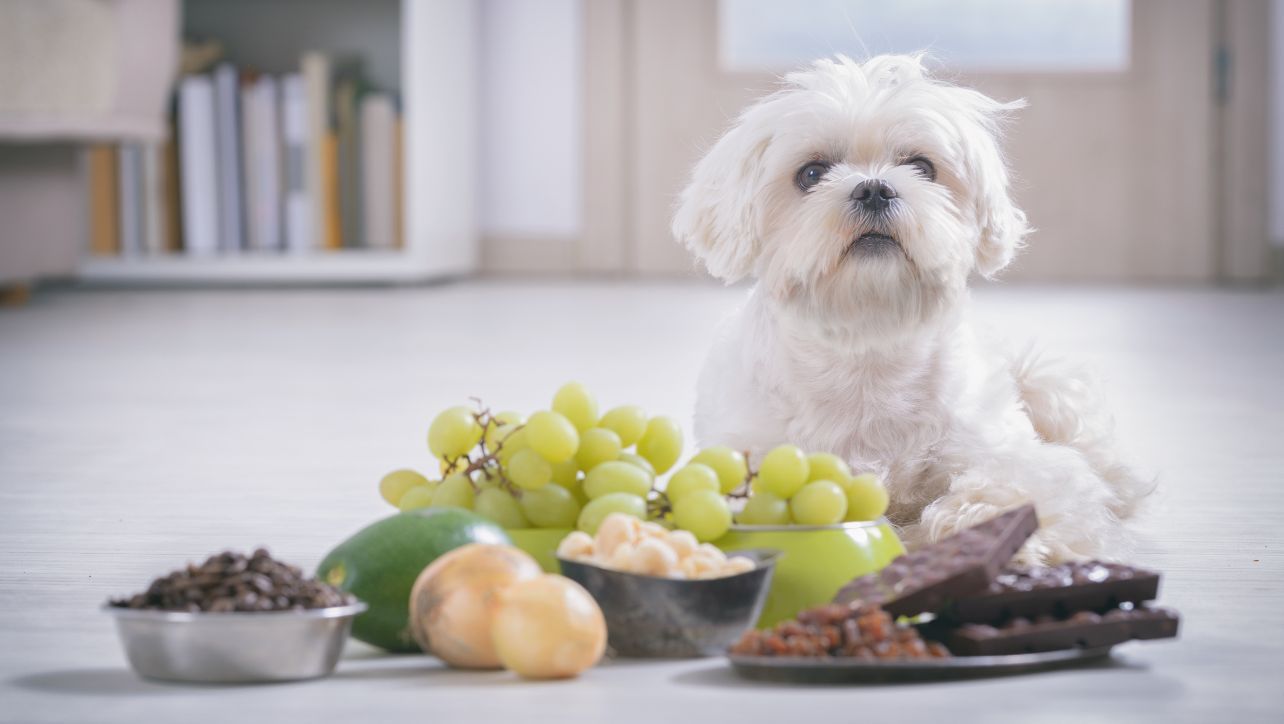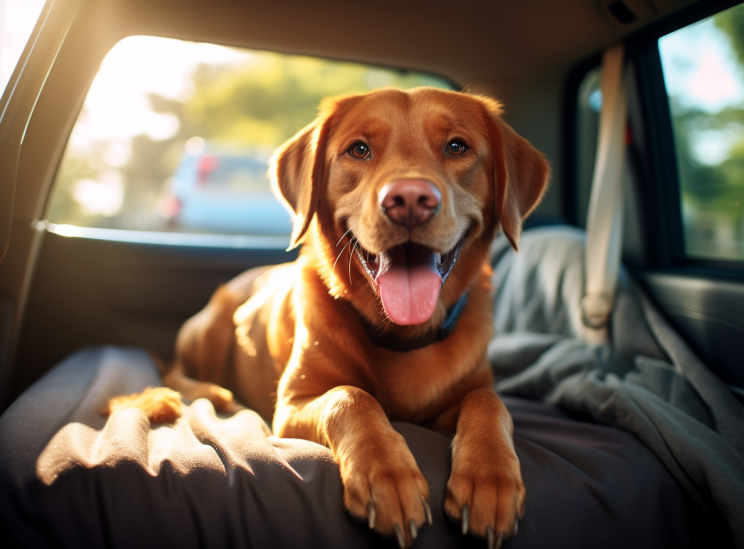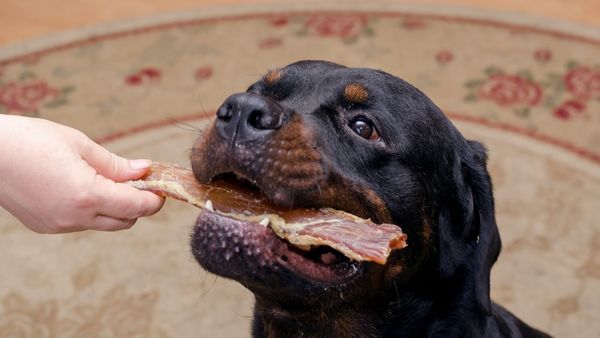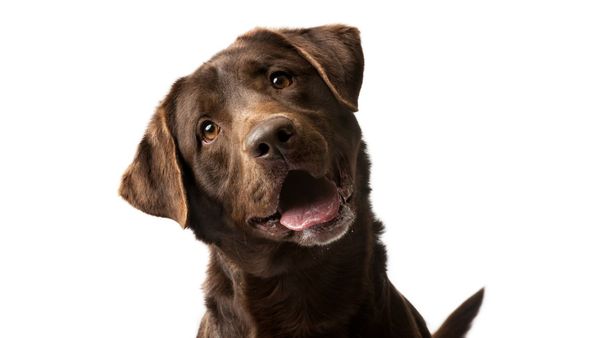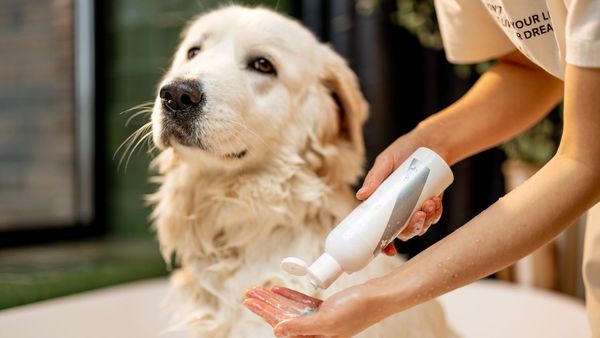As a responsible dog owner, it is crucial to know which foods are safe and which can be harmful to your furry friend. Many common human foods can be toxic to dogs, leading to severe health issues or even death.
In short, Dark chocolate and cocoa products are highly toxic to dogs. Macadamia nuts, almonds, pistachios and xylitol in sugar-free products can be deadly for dogs. Onions, garlic and other Allium family herbs as well as grapes/raisins, raw eggs/meat, avocados, alcohol & salty foods should also be avoided to protect your pet's health.
In this blog post, we will explore 13 toxic foods that answer the question, "What foods are toxic to dogs?" so you can ensure your pet stays healthy and happy.
Dark Chocolate and Other Cocoa Products

When it comes to toxic foods for dogs, dark chocolate and other cocoa products are some of the most well-known culprits. The reason for this danger lies in a chemical compound called theobromine, which is highly toxic to dogs. Theobromine has a detrimental impact on the heart, kidneys, and central nervous system of dogs. Ingestion of cocoa products can lead to symptoms such as vomiting, diarrhea, heart problems, tremors, seizures, and even death.
Dark chocolate poses a greater risk to dogs than milk chocolate due to its higher concentration of theobromine. However, regardless of the type of chocolate, it is essential to keep all cocoa products out of your dog's reach. If your dog consumes chocolate, it can cause several health complications. These include hyperactivity, vomiting, diarrhea, pancreatitis, an abnormal heart rhythm and seizures.
Ingestion of caffeine found in energy drinks can also cause similar symptoms in dogs, such as seizures, tremors, arrhythmias, and difficulty breathing. If you suspect that your dog has consumed chocolate or a caffeine-containing product, contact your vet immediately.
Preventative measures, such as keeping these products out of reach and being vigilant about what your dog eats, are essential to protect your dog's health.
Harmful Nuts: Macadamia, Almonds, and Pistachios

While nuts may seem like a tasty treat for humans, certain types, such as macadamia nuts, almonds, and pistachios, can be detrimental to dogs. Ingestion of macadamia nuts can lead to symptoms such as weakness, difficulty walking, muscle tremors, panting, distress, and elevated body temperature. Almonds and pistachios can cause weakness, overheating, and vomiting in dogs.
To ensure your dog has a nutritious and balanced diet, it is recommended to consult your veterinarian and obtain a suitable commercial dog food. Avoid feeding your dog these harmful nuts and opt for safer treats, or healthy foods such as green beans or other dog-friendly vegetables.
Keep in mind that other nuts can be choking hazards for dogs, so it is always best to exercise caution when introducing new foods to your dog's diet. Preventing your dog from ingesting these harmful nuts can help maintain their overall health and wellbeing.
The Dangers of Xylitol in Sugar-Free Products

Xylitol, an artificial sweetener commonly found in sugar-free gum and candy, can be extremely dangerous to dogs. Ingestion of products containing xylitol can lead to weakness, seizures, and potentially liver failure in dogs. Xylitol can be extremely dangerous. Just five pieces of gum containing it can prove fatal to a 65-pound dog.
To keep your dog safe from xylitol poisoning, avoid giving them any sugar-free products and always read labels carefully. If your dog ingests a product containing xylitol, contact your veterinarian immediately. In addition to sugar-free gum and candy, xylitol can be found in certain sugar-free peanut butter varieties, so be cautious when providing peanut butter treats to your dog.
It is crucial to be aware of the hidden dangers in common foods and to keep your dog away from any products containing xylitol. Prevention is key in maintaining your dog's health and avoiding the harmful effects of this toxic artificial sweetener.
Alcohol and Its Effects on Dogs

While it may seem obvious, it is important to stress that alcohol is toxic to dogs and should never be given to them. Ingestion of alcohol can lead to vomiting, diarrhea, and potential harm to the central nervous and digestive system in canines, even in small quantities.
Signs of alcohol poisoning in dogs can include vomiting, diarrhea, coordination difficulties, respiratory difficulties, coma, and even death. If you suspect your dog has consumed alcohol, seek veterinary assistance immediately.
As a responsible pet owner, it is essential to keep alcoholic beverages out of your dog's reach and never offer them a taste. Preventing your dog from consuming alcohol will help ensure their health and safety.
Raw Eggs and Biotin Deficiency

Feeding raw eggs to your dog may seem like a natural and healthy option, but it can lead to potential health issues. Raw eggs contain an enzyme called avidin, which can restrict biotin absorption in dogs. Biotin deficiency can result in an unhealthy coat, digestive issues, and skin problems.
Ingesting raw eggs can potentially lead to a biotin deficiency, which may cause an unhealthy coat, digestive issues, and skin problems in dogs. It is best to avoid feeding your dog raw eggs and instead opt for cooked eggs, which are a safer and healthier option.
By being aware of the risks associated with raw eggs and choosing safer alternatives, you can ensure that your dog maintains a healthy and balanced diet without the risk of biotin deficiency.
Milk and Dairy Products: Lactose Intolerance in Dogs
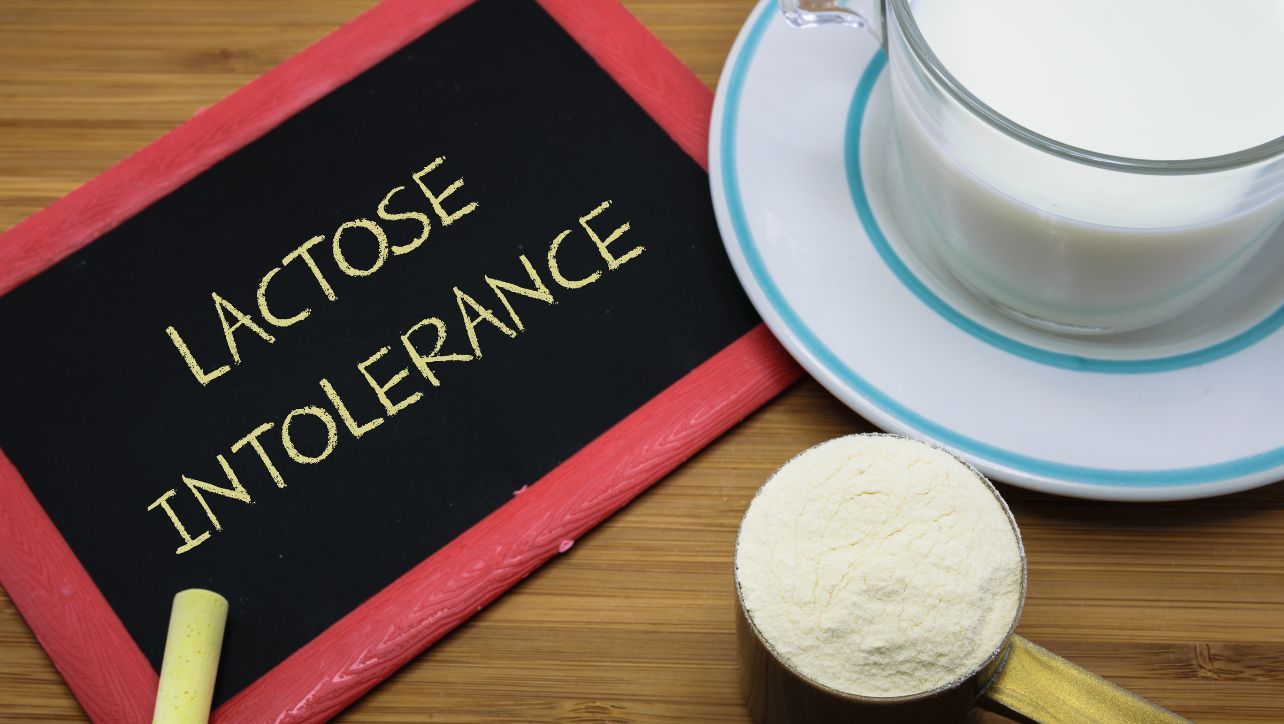
While some dogs can tolerate milk and dairy products, many dogs are lactose intolerant, which can lead to bloating, flatulence, and diarrhea. Milk and dairy products can cause diarrhea and gas depending on the dog's tolerance. Ice cream is not recommended for dogs due to its lactose, sugar, and fat content, while cheese can be consumed in small amounts.
The consumption of milk and milk-based products can lead to diarrhea, other digestive issues, and can potentially trigger food allergies in dogs. Instead of ice cream, consider offering your dog healthier alternatives, such as freezing bites of healthy fruits.
By being aware of your dog's lactose tolerance and offering suitable alternatives, you can ensure that your dog enjoys a healthy and balanced diet without the risk of digestive issues or allergies.
Onions, Garlic, and Other Allium Family Herbs

Allium family herbs, such as onions and garlic, can cause anemia in dogs, and chives and leeks are also hazardous. Onions and garlic contain sulfoxides and disulphides, which can lead to fewer red blood cells, cell damage, and anemia in dogs. Chives and leeks can cause potentially fatal anemia in dogs as well.
To protect your dog from the harmful effects of Allium family herbs, it is important to carefully review the labels of store-bought food before serving it to your pets. Additionally, avoid feeding your dog any human foods that contain these toxic food ingredients.
By being vigilant about the food you provide your dog and avoiding Allium family herbs, you can keep your pet safe from the risks of anemia and other health issues.
Grapes, Raisins, and Kidney Failure

Grapes and raisins are extremely toxic to dogs and can lead to kidney failure, even with small amounts. Symptoms of grape or raisin toxicity include vomiting, loss of appetite, lethargy, and possibly diarrhea within 12-24 hours after ingestion. Even one grape or raisin can be fatal for most dogs.
If your dog ingests grapes or raisins, it is crucial to seek veterinary care immediately. Ingestion of these fruits can lead to acute kidney failure and liver damage in canines.
By being aware of the dangers of grapes and raisins, and keeping them out of your dog's reach, you can protect your pet from the potentially fatal consequences of kidney failure and liver damage.
Raw Meat and Bacterial Risks

Feeding raw meat to your dog may seem like a natural and wholesome option, but it can actually pose significant risks. Raw meat may contain bacteria that can lead to food poisoning, as well as present a choking hazard.
To ensure your dog's safety, it is important to provide cooked meat, with all visible fat, including the skin on poultry, removed. Additionally, bones should be removed from the meat before giving it to a dog, as they can also pose a choking hazard.
By being aware of the risks associated with raw meat and providing cooked alternatives, you can ensure that your dog enjoys a safe and healthy diet without the risk of bacterial contamination or choking hazards.
Salty Foods and Sodium Ion Poisoning

Dogs love tasty treats, but salty foods can be dangerous for them. Excessive salt intake can lead to sodium ion poisoning, which can cause symptoms such as vomiting, weakness, diarrhea, muscle tremors, seizures, and even death if not treated promptly.
To prevent sodium ion poisoning in your dog, avoid feeding them salty foods such as potato chips, canned tuna, and other processed human foods. Instead, opt for healthier alternatives, such as carrot sticks, green beans, cucumber slices, or zucchini slices.
By being mindful of your dog's salt intake and offering healthier options, you can protect them from the potentially life-threatening consequences of sodium ion poisoning.
Frequently Asked Questions
What normal foods are poisonous to dogs?
It is important to be aware that some common foods can be highly poisonous to dogs, including alcohol, apple, apricot, cherry and plum seeds/pits, avocado, broccoli, caffeine and coffee grounds, chicken and turkey skin, ham, other fatty cuts of meat, chocolate, grapes and raisins.
What are 13 human foods that are toxic to dogs?
13 human foods that are toxic to dogs include grapes, raisins, avocados, chocolate, xylitol, fruit stones and pips, onions, garlic, macadamia nuts, raw eggs, alcohol, caffeine, and bread dough.
It is important to keep these food items away from your dog as consuming them could potentially be fatal.
What are the three toxic meats for dogs?
The three toxic meats for dogs are bacon, ham, and fatty trimmings, as these high-fat foods can cause pancreatitis, which can be life-threatening to dogs.
Raw/undercooked meats and eggs also contain bacteria that can be dangerous to both pets and humans.
Lastly, turkey bones can cause indigestion or vomiting in dogs.
What foods are toxic to dogs?
It is important to know which human foods can be toxic to dogs, as unfortunately some common items like chocolate, raisins, and garlic can be potentially fatal.
Many artificial sweeteners, such as xylitol, are dangerous for dogs too. Grapes, onions, macadamia nuts, avocados, and alcoholic drinks should also be avoided.
Can dogs eat pizza?
It is not recommended to feed your dog pizza, as it contains ingredients that are unhealthy for dogs and may cause gastrointestinal upset. Additionally, certain toppings and crusts can be choking hazards or even toxic to your pet.
Ultimately, it is not safe for dogs to eat pizza. Many common pizza ingredients are unhealthy for dogs and can cause digestive issues and other health problems. For the safety of your pet, it is best to avoid giving them pizza.
Summary
In conclusion, being aware of the toxic foods that dogs should never eat is essential for every responsible pet owner. This article has explored many of the foods and dangers of dark chocolate, harmful nuts, xylitol, alcohol, raw eggs, milk, dairy products, Allium family herbs, grapes and raisins, raw meat, and salty foods.
Please click here to see the Humane Society's take on this.
By being vigilant about the food you provide your dog, you can ensure that your pet remains healthy and happy.
It is important to remember that dogs have different dietary needs than humans, and many common human foods can be harmful to them. Always consult your veterinarian for guidance on providing a balanced diet for your dog and be cautious when introducing new foods to their diet.
As a responsible dog owner, your pet's health and well-being should be a top priority. By being informed about the toxic foods discussed in this article, you can ensure that your dog enjoys a long, healthy, and happy life by your side.
And as always, get out there and Love Life!


